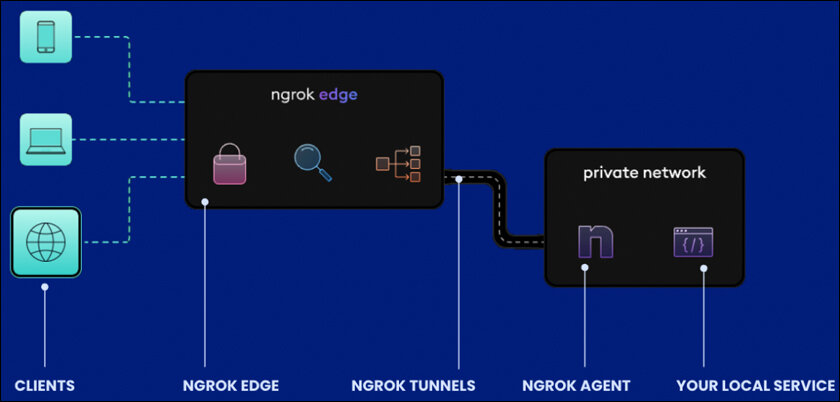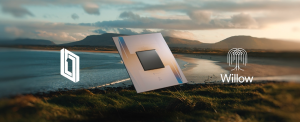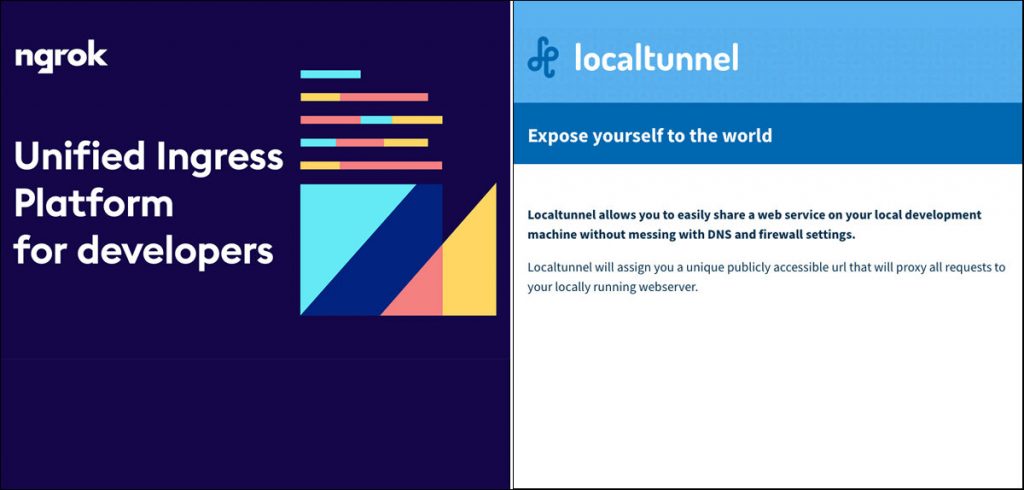Learning the power of Ngrok and Localtunnel will help you decide which platform to settle on when beginning your development path.
After spending several hours working on a website or application, you discover that it can only be accessed on your computer. Yes, it is frustrating. Here’s the good news: You do not have to be a tech genius to share your local projects. Think of a hidden tunnel that allows anyone to access your project in an instant-that’s the magic of development tunnelling tools such as Ngrok and Localtunnel. Intrigued? Explore the next few paragraphs to learn how to take your neighbourhood projects global!
How Tunnelling Comes to the Rescue!
Advanced tunnelling tools such as Ngrok and Localtunnel are used to create a secure channel for your application that can be viewed and tested by anyone with an internet connection.
- Deploy to a Staging Server: This is the process of deploying your code to a remote server connected to the Internet, It requires a lot of work and ongoing server maintenance, but it is also safe.
- Direct Access: Exposing your local server‘s IP address lets collaborators view your paintings without delay. Unfortunately, this strategy exposes the entire network to potential threats, which it may only sometimes be able to do due to complex community configurations or firewall settings.
Ngrok and Localtunnel provide a convincing option by way of creating a steady tunnel that forwards visitors from a selected port in your neighbourhood device to a publicly reachable URL. This novel technique gets rid of the need for complicated deployments or dangerous direct entry, Even though both Ngrok and Localtunnel are development tunnelling tools with the same objective of making it easy to share local development projects online, they are different in the way they are used and the people they are designed for.

Ngrok:
- Features: More sophisticated, it helps with specific protocols (HTTP/HTTPS, TCP, and so on.), custom subdomains for branding, and targeted traffic inspection equipment.
- Ease of Use: It requires obtaining an auth token to create a tunnel, as well as creating an account. On the other hand, the setup interface is easy to apply.
- Pricing: There is a free plan with restricted features and bandwidth, and subscription plans that release higher limits, state-of-the-art capability, collaboration gear, and more..
- Target Audience: Ideal for projects requiring more manipulation, amendment, and teamwork, or for advanced customers.
Localtunnel:
- Features: Concentrates on the basic functionality, providing a lightweight solution for the fundamental HTTP/HTTPS tunnelling.
- Ease of Use: Very simple to operate. Just install the Node.js package and a single command to create a tunnel – no sign-up or authentication is needed!
- Pricing: Entirely free and open-source, it is very suitable for individual developers or small teams.
- Target Audience: It is perfect for casual sharing and rapid demonstrations where simplicity and user-friendliness are the most important.
Use Cases and Scenarios
Ngrok
Professional Demos
- Client Presentations: A project to a client is delivered with Ngrok, which is reliable and secure, so the presentation can easily go on without any problems. Through custom subdomains, this project enhances the professional look and helps the customer put the business its own identity.
- Sales and Marketing: The sales teams can create a product-oriented, secure and branded URL through Ngrok and use it while conducting a pitch or live demo for prospective customers.
Collaborative Development
- Remote Team Collaboration: Ngrok facilitates communication between remote development teams. Team members can share and test the functionalities in real time from anywhere by using an easily accessible internet URL.
- Code Reviews and Pair Programming: Through the use of Ngrok, the developers can securely expose their local server and thus they can join live code reviews and pair programming sessions. This facilitates the debugging process as individuals can easily find and repair the bugs cooperatively.
Advanced Debugging
- Real-Time Traffic Analysis: The traffic inspection tools of Ngrok, which are extremely helpful for debugging the complex applications, are worth mentioning. With the help of developers, it is possible to track the incoming traffic, check the request and response headers, and examine the payloads to detect the problems.
- Testing Webhooks: The great thing about Ngrok is that it can be used to test webhooks and other external services that need a public URL to send data to. Through Ngrok, developers can make sure that their application correctly treats the external data in a development environment.
Secure Access
- Internal Tools: Companies can make use of Ngrok to create secure rights of entry to their inner tools and dashboards without disclosing them to the public internet. This guarantees that categorised records are secure while at the same time being available to the persons with the right to access them.
- Temporary Access: In the cases of temporary access needs, for example, the just-in-time demonstration or troubleshooting session, Ngrok offers a secure and easy turn of the tunnel, thus making the situation both convenient and safe.

Localtunnel
Quick Sharing
- Instant Project Sharing: The developer, in case he needs to quickly share a project with a friend or a collaborator, can use Localtunnel as an instant solution. One command is enough to create a public URL, which leads to instant access.
- Hackathons and Coding Events: At hackathons or coding events, speed is the key. The simplicity and fast setup of localtunnel make it possible for the users to share their progress and collaborate easily without spending time on the complex configurations.
Simple Demos
- Classroom and Workshops: In the schools, teachers can use Localtunnel to instantly show their projects to students for demonstrations and live coding sessions. The convenience of the method makes sure that the students’ attention is on learning instead of setting up.
- Startup Pitches: For the startups which are trying to pitch their product, Localtunnel gives them a quick and easy way to show their application to the potential investors without the need for a full deployment.
Individual Projects
- Personal Projects: Hobbyists and individual developers who work on personal projects can make use of Localtunnel’s easy and hassle-free approach. It helps them to present their work to friends, family, or online communities without the complexity of the setup.
- Open Source Contributions: Through Localtunnel, developers can share their local changes with the maintainers for the review and contributions to open-source projects are made. Thus, this leads to quicker feedback and collaboration among the community members.
Ad-Hoc Testing
- Browser Compatibility: Developers can make use of Localtunnel to carry out testing of their applications on different devices and browsers by sharing the public URL with testers. With this, developers can easily spot and resolve compatibility problems at the early stages of development.
- API Development: For developing API, Localtunnel makes quick testing of endpoints possible by providing a public URL which can be used with external API testing tools.
The Final Verdict: it depends on your purposes
Ngrok is an excellent option for developers who demand advanced feature set for usage in complicated projects, allow their team members to work together and perform comprehensive analysis (especially with paid plans). However, if you are a part of a casual development team or if you want to share the local project effortlessly, the Localtunnel command-free method is unbeatable.
Pro Tip: Ngrok and Localtunnel both provide free tiers, so don’t decline to explore and pick one that meets your needs.
Remember: Development tools like tunnelling are indispensable thing for saving your time and increasing your work performance. Learning the power of Ngrok and Localtunnel will help you decide which platform to settle on when beginning your development path.
In case you missed:
- What’s new in Azure app service at Build 2024: Key announcements and features
- Deciphering RHEL AI: An Open Source Approach to Artificial Intelligence
- Forecasting the Future: Generative AI in Software Testing for 2024
- Devin AI: Software Engineers’ Next-Gen Assistant
- Decoding BlackBox AI: Your Creative Coding Partner
- Kickstarting your MLOps journey in 2024: Essential practices and strategies
- Vulnerability Assessment vs Penetration Testing: Choosing the Right Strategy in 2024
- Google’s Project Astra: An Overview of Future AI Assistants
- GPT-2 Chatbot Mystery: Outperforming GPT-4 or Next-Gen AI?
- Mind Meld: Brain-Computer Interfaces Unlock the Future (2024 and Beyond!)









